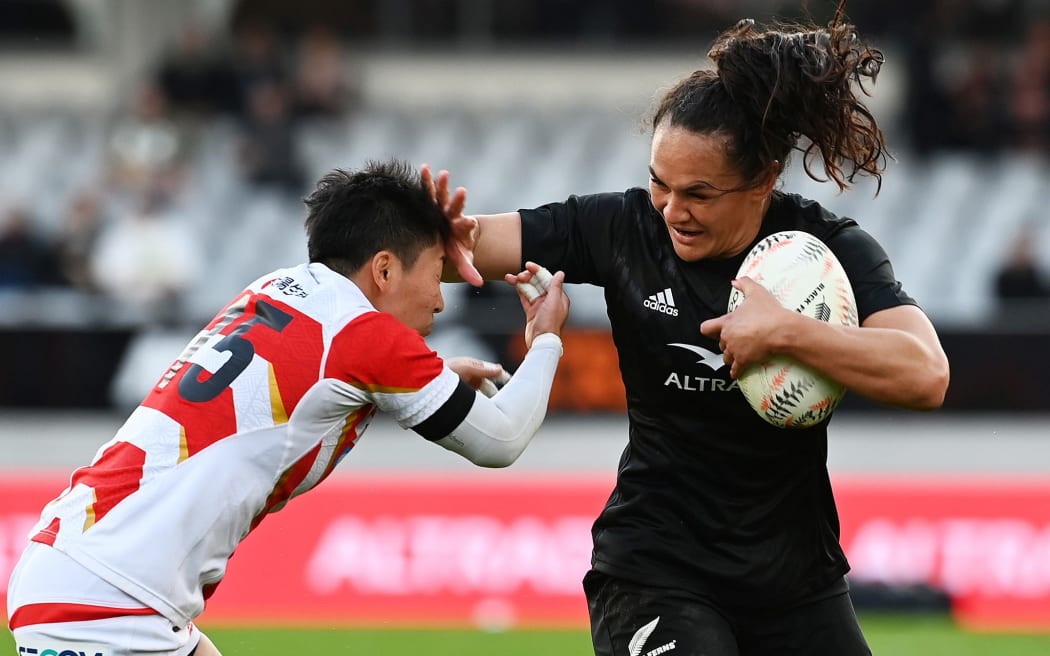Black Ferns: Where this World Cup will be won and lost

Black Ferns player Portia Woodman in the Black Ferns latest test against Japan on Saturday 24 September 2022.
Photo: Andrew Cornaga / www.photosport.nz
Analysis – Two of New Zealand’s great rugby coaches believe the battle for the Rugby World Cup will come down to who can keep their composure, Jamie Wall writes.
It was smiles aplenty two days out from the start of Rugby World Cup 2021, at least in the Black Ferns’ final press conference. That’s because it’s hard not to be smiling in the same room as Wayne Smith and Sir Graham Henry, the two coaches who have come out of retirement to take on what, not that long ago, seemed like rugby’s impossible mission.
The much-vaunted attendance figure at Eden Park on Saturday, said to be over the 35,000 mark, was represented by the media turnout at the Rydges Hotel conference room in central Auckland. It was probably the first ever Black Ferns presser that required chairs to be put out for the large group of TV and print journalists, who normally all would be dealing with a much more tense and untrustworthy All Black environment.
The questions were about the side Smith had named, the motivation and excitement of the players, and how the squad was tracking after what can only be described as the most tumultuous period any New Zealand representative rugby team has ever been through. For context: after all the All Blacks’ much-documented woes this year, the coach and vast majority of the playing corps have stayed the same.
Contrast that to the Black Ferns, who have discarded 13 players, including the captain, from last year’s now infamous, winless tour. Smith has named 15 test debutantes in his six tests in charge and is continuing to roll the dice with his selections as the tournament starts.
But that’s fair enough. This is a three-horse race between the Black Ferns, France and the all-powerful England, so Smith can bide his time right up to the semis to create the team and gameplan he needs. He conceded, though, that there is still one area that needs to be completely ironed out if the side is to have any chance. World Cups are won on discipline, discipline is gained by experience – which is something a lot of the Black Ferns don’t have.
“Generally, there’s a bit of a lack of knowledge like there is in the men’s game,” Smith said.
“We’re pretty clear in what we have to do. We have referees at training helping us in terms of discipline, just ensuring we’re doing everything we can to get better in that area.”
Henry offered his thoughts, pointing out that “there’s less rugby played in the southern hemisphere for women.”
“England have about 1200 caps in their 32 [player squad]. We’ve got about 380. So that’s a massive difference in experience. That’s a massive advantage.”

Black Ferns coach Wayne Smith and technical coach Graham Henry during the New Zealand Black Ferns Team Announcement for the Women’s Rugby World Cup 2021 on 6 October 2022.
Photo: Photosport
That’s a fair point. Penalties played a huge role in the underdone Black Ferns getting thrashed last year, with England and France happy to wait for their piggyback downfield off the numerous ruck infringements and offsides. This was the real difference between the sides, the true sign of professionalism, because really the gap in fitness and strength can be bridged with the right amount of courage. It just needs to be backed up by cool heads as well.
The Super Rugby Aupiki competition should have been a way to address the high number of infringements, but the disruption it faced meant that there was barely enough time for the teams to be on the park, let alone refine their adherence to the laws. The final two games saw an astounding 68 penalties blown (a rate of almost one every two minutes).
But there have been signs of improvement. Since this year’s Pacific Four series match against Canada, which saw two yellow cards, penalty counts have dropped. The recent win over Japan, while admittedly a blowout, only saw 15 in total. But the key message that the Black Ferns should be heeding when they emerge from pool play is that it only takes one slip up to cost a game, which in turn will see them bounced out of a World Cup.
Smith reckons that having positive discussions with the officials will play a big part in how the Black Ferns set the standard.
“I think we’ll be talking to the refs all the time. Are we doing OK? Are giving enough quick ball, being onside? I think those sorts of conversations are really positive on the field. I just think a really good relationship needs to be established, then we can have a good game.”
But Henry, who up until that point had been happy to offer his brand of dry quips when called upon in the press conference, suddenly hit a serious and laconic mode when he talked discipline. What he had to say about giving away penalties has echoed through changing rooms and rugby club corridors forever:
“At the end of the day, you’ve got no excuse.”
For all the latest Sports News Click Here
For the latest news and updates, follow us on Google News.
